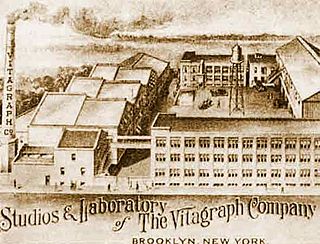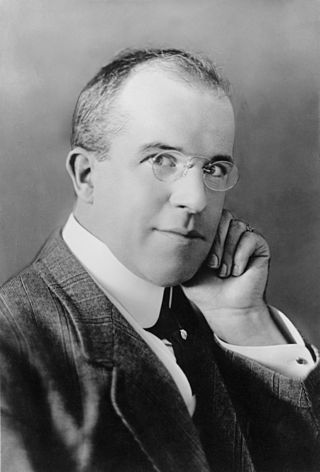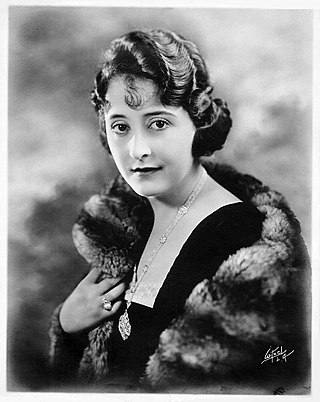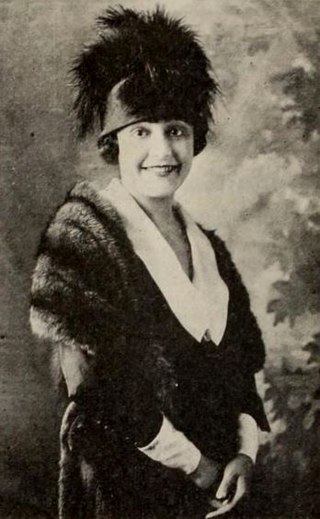Related Research Articles
The year 1915 in film involved some significant events.

Essanay Studios, officially the Essanay Film Manufacturing Company, was an early American motion picture studio. The studio was founded in 1907 in Chicago, and later developed an additional film lot in Niles Canyon, California. Its various stars included Francis X. Bushman, Gloria Swanson and studio co-owner, actor and director, Broncho Billy Anderson. It is probably best known today for its series of Charlie Chaplin comedies from 1915-1916. In late 1916, it merged distribution with other studios and stopped issuing films in the fall of 1918. According to film historian Steve Massa, Essanay is one of the important early studios, with comedies as a particular strength. Its founders, George Kirke Spoor and Anderson, were subsequently awarded special Academy Awards for pioneering contributions to film.

Vitagraph Studios, also known as the Vitagraph Company of America, was a United States motion picture studio. It was founded by J. Stuart Blackton and Albert E. Smith in 1897 in Brooklyn, New York, as the American Vitagraph Company. By 1907, it was the most prolific American film production company, producing many famous silent films. It was bought by Warner Bros. in 1925.

James Stuart Blackton was a British-American film producer and director of the silent era. One of the pioneers of motion pictures, he founded Vitagraph Studios in 1897. He was one of the first filmmakers to use the techniques of stop-motion and drawn animation, is considered a father of American animation, and was the first to bring many classic plays and books to the screen. Blackton was also the commodore of the Motorboat Club of America and the Atlantic Yacht Club.

William Wallace Halleck Reid was an American actor in silent film, referred to as "the screen's most perfect lover". He also had a brief career as a racing driver.

The Lubin Manufacturing Company was an American motion picture production company that produced silent films from 1896 to 1916. Lubin films were distributed with a Liberty Bell trademark.

Clara Kimball Young was an American film actress who was popular in the early silent film era.

Arthur Edeson, A.S.C. was an American cinematographer. Born in New York City, his career ran from the formative years of the film industry in New York, through the silent era in Hollywood, and the sound era there in the 1930s and 1940s. His work included many landmarks in film history, including The Thief of Bagdad (1924), All Quiet on the Western Front (1930), Frankenstein (1931), The Maltese Falcon (1941), and Casablanca (1942).

Robert Edeson was an American film and stage actor of the silent era and a vaudeville performer.

The Call of the North is a 1914 American silent adventure-drama film directed by Oscar Apfel and Cecil B. DeMille. It is based on the 1903 novel, The Conjuror's House; a Romance of the Free Forest by Stewart Edward White and its 1908 play adaptation The Call of the North by George Broadhurst. Robert Edeson starred in the play and reprises his role in this film. He played a dual role of both Ned Stewart and his own father, Graehme Stewart.

The Caveman, also styled as The Cave Man, is a 1926 American silent comedy film produced and distributed by Warner Bros. Lewis Milestone directed the Darryl Zanuck scripted story taken from the play The Cave Man by Gelett Burgess. Matt Moore, Marie Prevost, and Hedda Hopper star. A small role is played by a young Myrna Loy, who was just starting out in her long career.
The Caveman is a lost 1915 silent film comedy directed by Theodore Marston and starring Robert Edeson. It was produced by the Vitagraph Company of America and is based on a 1911 stage play, The Caveman. Several of the scenes were filmed in the Homestead Steelworks.

Extravagance is a lost 1921 American silent melodrama film, directed by Phil Rosen. It stars May Allison, Robert Edeson, and Theodore Von Eltz, and was released on March 7, 1921.

Astra Film Corp was an American film production company that produced silent films. Louis J. Gasnier was the company's president. George B. Seitz co-founded it. It was making films by 1916. It became Louis J. Gasnier Productions after Seitz left.

Edwin Middleton (1865–1929) was a film director in the United States.
Ralph Kellard was an actor in the U.S. who appeared in theatrical productions and films. His film work included leading roles in several films such as The Shielding Shadow (1916), The Restless Sex (1920) and The Cost (film). His son Robert Kellard also became an actor. His other son, Thomas Kellard was also an actor and then became a Vice President at Lockheed Shipbuilding and Construction in Seattle, Washington. Ralph's grandson's from Thomas, Phil and Rick Kellard, are both television writers and producers. His great grandson, Matthew Kellard is a screenwriter.

Fred Hornby was a film director and comedic actor in silent films. He also performed in theatrical productions.

Betty Howe was an American actress in silent films.

The Wheels of Justice is a 1915 American silent film written by Edward J. Montagne, directed by Theodore Marston, and starring Dorothy Kelly, James Morrison and Louise Beaudet. It premiered in February 1915, before its wide release in August of the same year. It was met with mostly positive reviews.
The Surprises of an Empty Hotel is a 1916 American silent film written by Jasper Ewing Brady, directed by Theodore Marston, and starring Charles Richman, Charles Eldridge and Leo Delaney.
References
- ↑ "Mortmain". September 7, 1915 – via memory.loc.gov.
- 1 2 "Moving Picture World and View Photographer". World Photographic Publishing Company. September 7, 1915 – via Google Books.
- ↑ "The Project Gutenberg eBook of Mortmain, by Arthur Train".
- ↑ Rhodes, Gary D. (2018). The Birth of the American Horror Film. ISBN 9781474430883. JSTOR 10.3366/j.ctvxcrw4d.
- ↑ "Motion Picture Story Magazine". Macfadden-Bartell. September 7, 1915 – via Google Books.
- 1 2 "Silent Era : Progressive Silent Film List". www.silentera.com.
- ↑ "Mortmain ??, Harrisburg, Pennsylvania". Harrisburg Daily Independent. 27 September 1915. p. 9.
- ↑ "MORTMAIN (1915) by Theodore Marston, Cinefania". www.cinefania.com.
- ↑ "Mortmain (1915)" – via letterboxd.com.